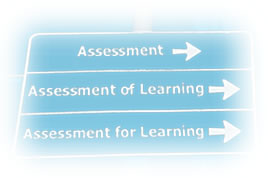

Links - Papers and Articles - Peer Assessment
Berg, I. van den, Pilot, A. & Admiraal, W. (2003). Peer assessment in university teaching. An exploration of useful designs. Paper presented at the European Conference on Educational Research, University of Hamburg, 17-20 September 2003. ![]()
This research focuses on the contribution of peer assessment to the acquisition of writing skills by university students. Aspects that have been considered include the implementation of peer assessment by students and teachers, the components of peer feedback, the interaction between students during oral peer feedback, students' achievement and students and teachers' evaluation of peer assessment.
Bostock, S. (2000). Student peer assessment ![]()
Student assessment of other students' work, both formative and summative, has many potential benefits to learning for the assessor and the assessee. It encourages student autonomy and higher order thinking skills. Its weaknesses can be avoided with anonymity, multiple assessors, and tutor moderation. With large numbers of students the management of peer assessment can be assisted by Internet technology.
Boud, D., Cohen, R. & Sampson, J. (1999). Peer learning and assessment. Assessment and Evaluation in Higher Education, 24(4), 413-426. ![]()
This paper examines some of the main assessment issues in connection with peer learning and suggests ways in which the benefits of this approach can be maintained while still meeting the formal assessment requirements of the course.
Lejk, M. & Wyvill, M. (2001). The Effect of the Inclusion of Selfassessment with Peer Assessment of Contributions to a Group Project: a quantitative study of secret and agreed assessments. Assessment and Evaluation in Higher Education: An International Journal, 26 (6), 551-562. ![]()
This paper presents the results of an experiment which compared secret and agreed peer and self-assessment of contributions to a group project.
Lim, Y. L. (2003). Implementing Effective Peer Assessment. CDTL Brief, Newsletter, 6(3). ![]()
This article highlights possible difficulties in implementing peer assessment and suggests practical solutions to facilitate effective peer assessment.
Orsmond, P., Merry, S. & Reiling, K. (1996). The importance of marking criteria in the use of peer assessment. Assessment & Evaluation in Higher Education, 21(3), 239-250. ![]()
This paper reports a study which implemented and evaluated a method of peer assessment, as a formative and summative assessment procedure
Sivan, A. (2000). The Implementation of Peer Assessment: an action research approach. Assessment in Education. 7 (2), 193-213. ![]()
This paper examines the process of implementing peer assessment in higher education. Based on the results of the action research, the paper recommends introducing peer assessment into the curriculum gradually and in a consistent way.
Home | Purposes | Background | Research Plan | Team | Schools | Works | Links